Back Porch Music Personality Found Quilty of Sexual Misconduct
Casey Redd was 14 when she began going to shows put on by popular indie-rock label Burger Records. The concerts, featuring contemporary garage and punk bands, were often all-ages, and a swell of excited teenage girls would be in attendance.
Three years later, when Redd was 17, she says Phil Salina, the then-29-year-old singer of the Portland-based goth-pop duo Love Cop, had sex with her in the back seat of her car. He told her to meet him at the far corner of the parking lot at the Burger Records store in Fullerton, she says, then instructed her to drive a few blocks away to a darkened neighborhood where she alleges the statutory rape took place. (The age of consent in California is 18.)
A few days later, they again had sex outside of a house show in Pomona, she says.
"I felt confused and violated," she says, adding that it took time, reflection and therapy to come to terms with what happened to her in 2013. "For years, many years, I didn't really talk to anyone about it — I felt really ashamed — I felt like it was my fault for engaging with him in the first place."
She did tell one of her close friends about her sexual encounters with Salina. That friend, who regularly attended Burger Records shows with Redd, corroborated Redd's story to The Times in a phone interview.
Salina did not respond to multiple requests for comment by The Times.
The Times, however, reviewed texts that Salina sent to Redd after she went public with her accusations. In them, Salina apologizes and expresses remorse, writing, "I won't ever be allowed to play music again and that is fair." He also wrote that he didn't think of their relationship as abusive at the time but that he now understands that it was wrong.
"I will be sorry until I die," he wrote.

(Tim Mosenfelder/Getty Images)
Redd went public with her experience last summer, sharing her story on her personal Instagram page and soon after on a page she created called Lured_By_Burger Records, which posted accusations about men in the Burger scene from other female fans and artists. The page quickly accumulated thousands of followers, spurring online outrage, national media coverage and public apologies from many of the accused musicians.
Within a week, the label ceased operations completely, prompting a long-overdue reckoning about the prevalence of sexual abuse in Southern California's underground/DIY music scene.
One of Burger's owners, Sean Bohrman, declined to be interviewed for this story. The other, Lee Rickard, did not respond to a request for comment. But Bohrman acknowledged in an interview with Seattle radio station KEXP after Burger's collapse that the label — which published recordings by nearly 1,200 bands during its 13 years in existence, in addition to hosting concerts and festivals and running a record shop in Fullerton — did not scrutinize the personal behavior of the musicians with whom it worked. And it's not clear that management was paying attention to the exploitative sexual dynamics of the scene Burger fostered.
As the allegations emerged, the label issued a statement that read in part: "We extend our deepest apologies to anyone who has suffered irreparable harm from any experience that occurred in the Burger and indie/DIY music scene."
But the problems did not involve Burger musicians alone. The Times interviewed nearly two dozen women who detailed varying degrees of sexual abuse and harassment by musicians in Southern California's indie rock scene during the past 15 years.
A number of women spoke on the record; others chose to remain anonymous, either because they feared reprisal or had already experienced it after posting their experiences online.
Their stories about what happened in and around the Burger scene illuminate a broader culture of sexual abuse in Southern California's underground music world that — more than three years into the reckoning brought by the #metoo movement — has remained largely in the shadows.
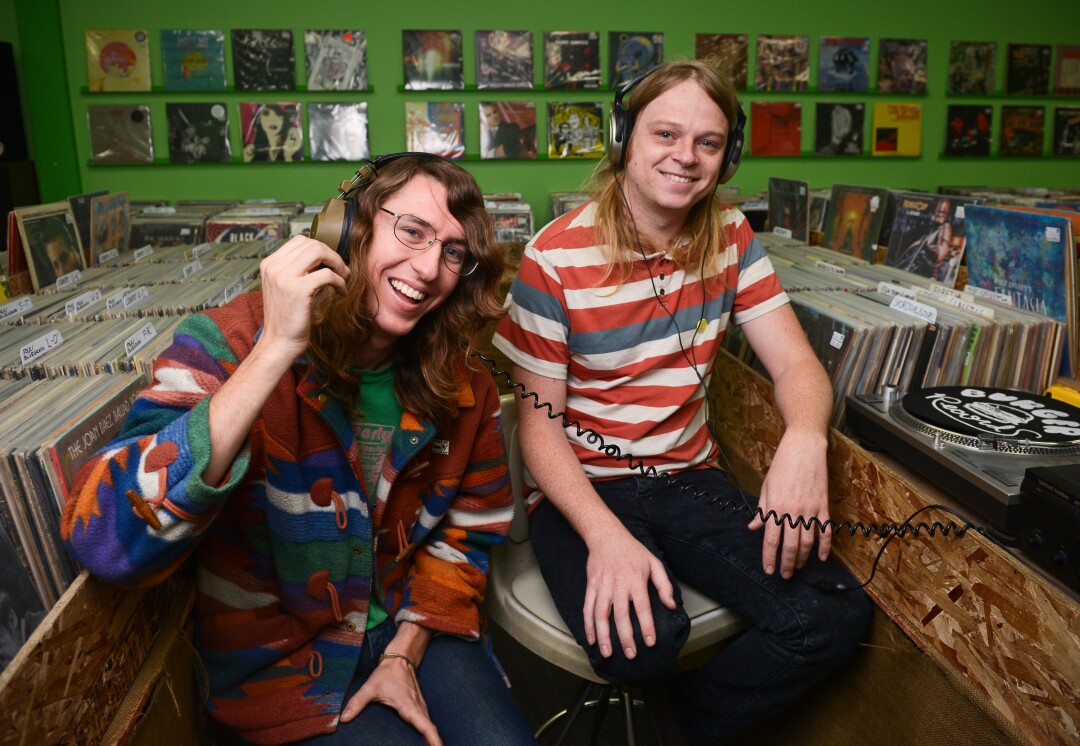
Lee Rickard, left, and Sean Bohrman. They founded Burger Records in 2007.
(Mackenzie Reiss/Orange County Register/SCNG)
A high-school clubhouse
Burger Records was founded in 2007 by Bohrman and Rickard, in part to release music from their own band at the time, Thee Makeout Party. Burger championed catchy, homemade power-pop, surf-rock and bubblegum punk. It opened a record shop in Fullerton in 2009 and Bohrman and Rickard lived there, washing their hair under a spigot in the alley and running the label out of the back. The shop soon became a popular gathering spot for music fans.
As Burger grew, the label hosted a slew of popular shows and festivals around Southern California including Burger-a-Go Go, which paid tribute to all-female-fronted bands, and the two-day Burgerama, which annually drew thousands of fans and featured eclectic lineups of dozens of underground garage bands and indie rock giants including Weezer, Ariel Pink, Fidlar, the Spits, Ty Segall, Roky Erickson and Gang of Four.
Burger's reputation was burnished internationally in 2014 when fashion design house Yves Saint Laurent featured the label's music in Paris runway shows.
An all-ages ethos was key to Burger's identity. Young fans, including those in high school, often mingled with older fans and musicians. Many women interviewed by The Times described rampant drug and alcohol use, even at shows where alcohol was not for sale.
The label did not follow a traditional business model. It didn't sign bands or negotiate contracts. It just reached out to bands it loved and released mostly limited-edition runs of cassette tapes, leaving it to other labels to court the musicians it championed. It also made money from the concerts and festivals that it convened.
Still, Burger's output was prolific. It's unusual for a label to release music in such abundance. That volume is partially how Bohrman explained the lack of oversight at Burger in a September 2019 interview with KEXP.
"When I find a band I really like, do I have to ask, 'Have you raped anybody, and have you done this or that'," he said. "And then how do you follow up on that and get the full story? That sounds like a nightmare, and that's not why I got into music."
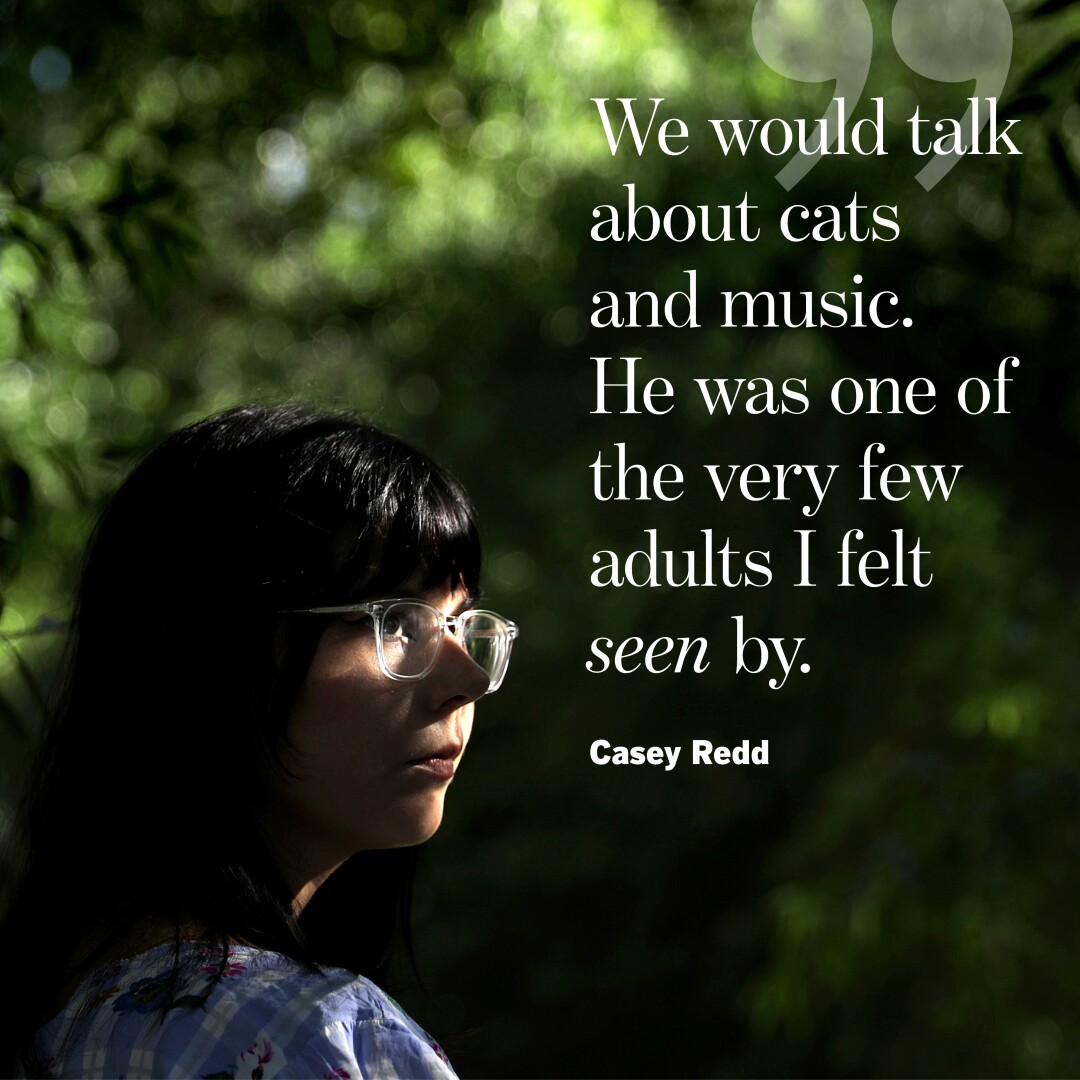
(Christina House / Los Angeles Times)
At first, Redd felt at home among Burger fans and bands, and in the spaces they occupied. All-ages shows were held in warehouses, the record shop and a large venue called the Observatory in Santa Ana. The Fullerton store was painted a bright key-lime green and featured a highly cultivated sense of graphic design characterized by a zany, cut 'n' paste punk aesthetic in bold primary colors (Bohrman minored in graphic design and cranked out the labels' merch). The store was filled with buttons ("I'm a Burger Girl," was one), stickers and posters, many featuring vintage-inspired, punk-themed cartoons. There was a back room where musicians, staff and customers sometimes gathered. It felt, say many of the women who hung out there, like a high-school clubhouse.
"In their marketing, they described themselves as perma-teens," recalls Redd of Burger Records.
Redd says she began to regularly receive messages from some of the men in bands whose accounts she had followed on social media.
When Love Cop's Salina first reached out to Redd, she was 17. Salina was working as a mental-health counselor in Portland specializing in addiction. Redd's family had a troubled history with drugs and addiction, and she came to trust Salina. She says they talked nearly every day.
"He knew the trauma that I carried and ... my age and vulnerability. It was definitely a grooming relationship," Redd says, recalling how lonely, depressed and anxious she was at that time. "We would talk about cats and music. He was one of the very few adults I felt seen by."
Months later, Salina came to Orange County to play a Burger show and invited Redd. It was her first time driving on the freeway when she crossed county lines from her hometown of Corona to Fullerton where she says their first sexual encounter took place.
Afterward, Redd alleges, Salina messaged her often, asking for nudes and sexual photos. For the most part, she ignored him but sometimes she engaged with him, not fully understanding how inappropriate the situation was.
Redd stopped going to Burger shows when she was 18, but at that point she says she already knew several other underage teenage girls who had been abused by adult men in the scene.
"I idolized these people when I was a teenager. I wasn't able to see things for what they really were," she says. "It felt like a magical time that turned dark very quickly."
Redd is now 24 years old. She is a longtime vegan and animal rights activist with a soft but firm voice and a thoughtful, straightforward way of speaking. She says that over the years, not a day went by that she didn't think about the fact that she was not alone in her experience.
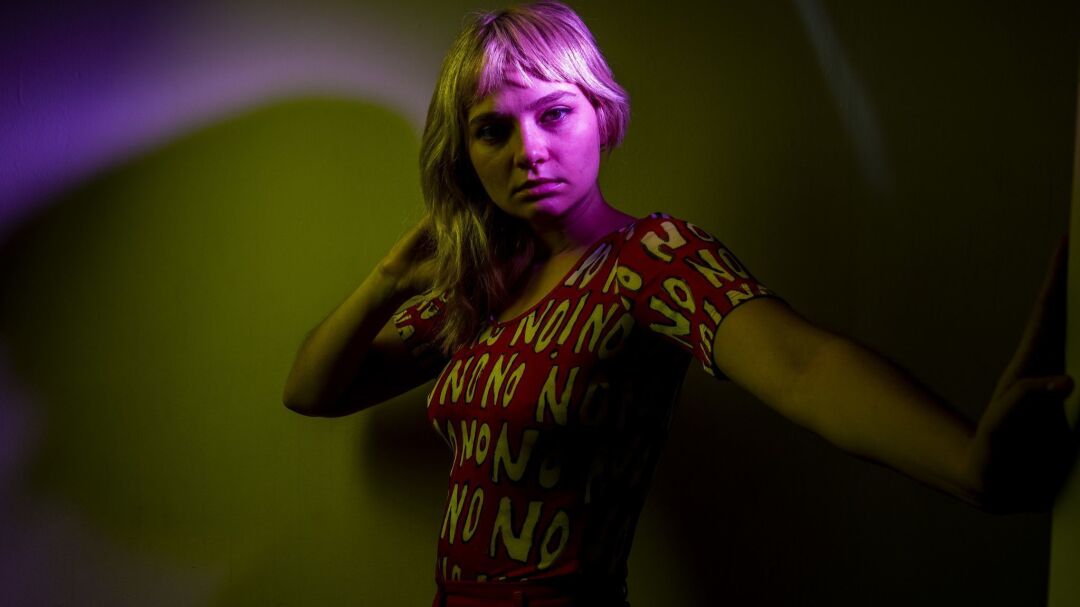
Cherry Glazerr's Clementine Creevy in 2019.
(Kent Nishimura / Los Angeles Times)
That fact became painfully clear during the summer on July 15 when Clementine Creevy, the frontwoman of Cherry Glazerr, which released its debut album through Burger, posted a statement on Instagram accusing Sean Redman, the bass player of another Burger-affiliated band called the Buttertones, of starting a sexual relationship with her when she was 14 and he was 20. That relationship, she wrote, was also emotionally abusive.
She emphasized, "I want to say with no conditionality whatsoever that THIS IS NOT ATYPICAL OF THE MUSIC SCENE."
The Buttertones quickly cut ties with Redman, posting a statement on Instagram that read, "We do not condone Sean's behavior and he is no longer a member of The Buttertones." The band was still dropped by its label, Innovative Leisure. The Times was unable to reach Redman for comment.
Two days after Creevy's disclosure, Redd also spoke up — posting on July 17 about her experience with Salina on her personal Instagram account. The following day, Burger Records turned off the comments on an Instagram post after women began writing about their traumatic experiences there. Redd saw Burger's action as silencing victims, so she created the Lured_By_Burger_Records Instagram page.
Redd's second post concluded, "If you're going to sell tickets to children, check your creepy friends and don't let them in."
Another post, which a woman who wished to remain anonymous asked Redd to share, read, "I have personally had many poor and inappropriate relationships and interactions with adult men within these scenes when I was a very young teen."
Similar stories from dozens of women soon began pouring into Redd's direct message box, she says. Many of the accusations of rape, sexual assault, abuse, harassment and grooming were about Burger bands, and many were about the local underground music scene in general. Redd found herself spending up to 18 hours a day on the site, fielding comments, posts and allegations. She says the experience was emotionally and physically overwhelming.
As scrutiny of Burger intensified, other women spoke out and bands began to fall. Lydia Night, the singer of The Regrettes, accused SWMRS drummer Joey Armstrong (son of Green Day's Billie Joe Armstrong) of sexual misconduct and coercion, beginning when she was 16 and Armstrong was 22. SWMRS released music through a variety of labels, including Burger. Armstrong posted an apology on Instagram, adding that he didn't agree with some of the things Night said about him, but that, "it's important that she be allowed to say them and that she be supported for speaking out."
Arrow de Wilde, lead singer of L.A. indie rock band Starcrawler, said she was sexually assaulted by a male stripper hired by the singer of the Growlers while the bands were on tour together in Australia. (The Growlers released music through Burger.) De Wilde did not name the stripper, instead focusing on the humiliation she says she experienced when members of the Growlers filmed the incident while laughing. Singer Brooks Nielsen issued an apology and two members left the band, although the Growlers recently listed three new tour dates for 2021.
The garage-rock musician Nobunny (Justin Champlin), who released numerous albums on Burger, admitted to a history of sexual misconduct and announced that he would no longer play music. "I f—ed up bad. I used my power and influence to take advantage of young women and teenage girls," he wrote in a statement published by Pitchfork; and other, smaller bands, such as L.A.'s Mystic Braves, which released a cassette through Burger in collaboration with Lolipop Records, temporarily disbanded in late July after acknowledging that harm had been done by certain members.
Redd was not alone in posting the harrowing stories of others. A number of other anonymously run accounts cropped up, including empowerment.la, which supports victims of abuse in the region's music scene.
Scanning the stories on these accounts is like navigating a landmine of trauma, sorrow and bravery. Chunks of text pop at the reader: "Gaslighting and manipulating me," "he ignored any and all physical signs of me trying to escape," "choked her near the point of unconsciousness," "I was too scared to report it," "I blacked out and woke up in a studio naked and was bleeding and felt sore."
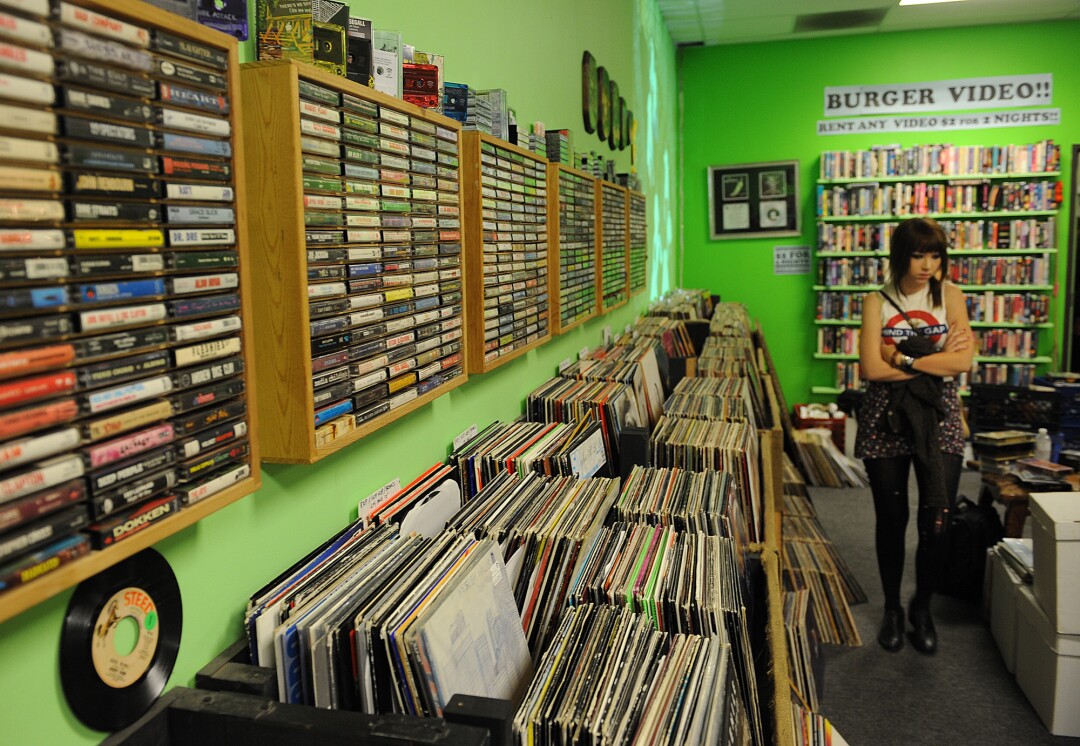
The Burger Records store in Fullerton.
(Wally Skalij/Los Angeles Times)
On July 21, Burger co-founder Lee Rickard stepped down from his role as label president and divested all interest in the label.
The label issued a statement that read in part that it was "deeply sorry for the role Burger has played in perpetuating a culture of toxic masculinity."
Five days after Redd's first Lured_By_Burger_Records post, Burger folded completely, taking with it the operation's entire digital footprint. Bohrman capped his announcement of the company's dissolution to a Pitchfork reporter with a Porky Pig GIF: "That's all folks."
Except it wasn't. Not for the young women who had their lives turned upside down by the predation they say they experienced as naïve teenagers idolizing their rock gods. And not for the legions of girls and women of all ages suddenly confronting feelings about how all of this seemed eerily similar to their own experiences in the underground music scene, Burger-related or not.
"A recipe for disaster"
Sexual abuse has long been part and parcel of the anything-goes, predominantly masculine rock 'n' roll ethos cultivated by the musical culture, the bands that populate it and the labels that traffic in it, say many of the women interviewed for this story by The Times.
Exploitation by male musicians is often met with widespread acceptance from a scene that supports sexual fetishization of women as passive vehicles for male pleasure. The abuses endemic to Burger Records, they say, are representative of the problem but far from unique.
Indeed, the sexual conquest of young women by older rock stars is often celebrated, says Michelle Butler, a psychologist who serves as executive director and co-founder of Polaris, a residential treatment center for teens. (Butler's husband is also a music producer.)
"Many of these revered rock gods absolutely committed statutory rape. We all know it, it's been well-documented, and somehow it's been written off as part of the groupie culture," Butler says. "So you take somebody who is like the David Bowie of their little scene, and you take somebody who is impressionable and maybe a little lost, and it's a recipe for disaster."
In film and television production, some safeguards have been erected in recent years to protect vulnerable artists including the use of intimacy coordinators on set and new channels for reporting abuse. The music scene, by comparison, says one young female musician with experience in TV, is a "dumpster fire" when it comes to protecting female musicians. Fans in clubs, other women say, are simply on their own.
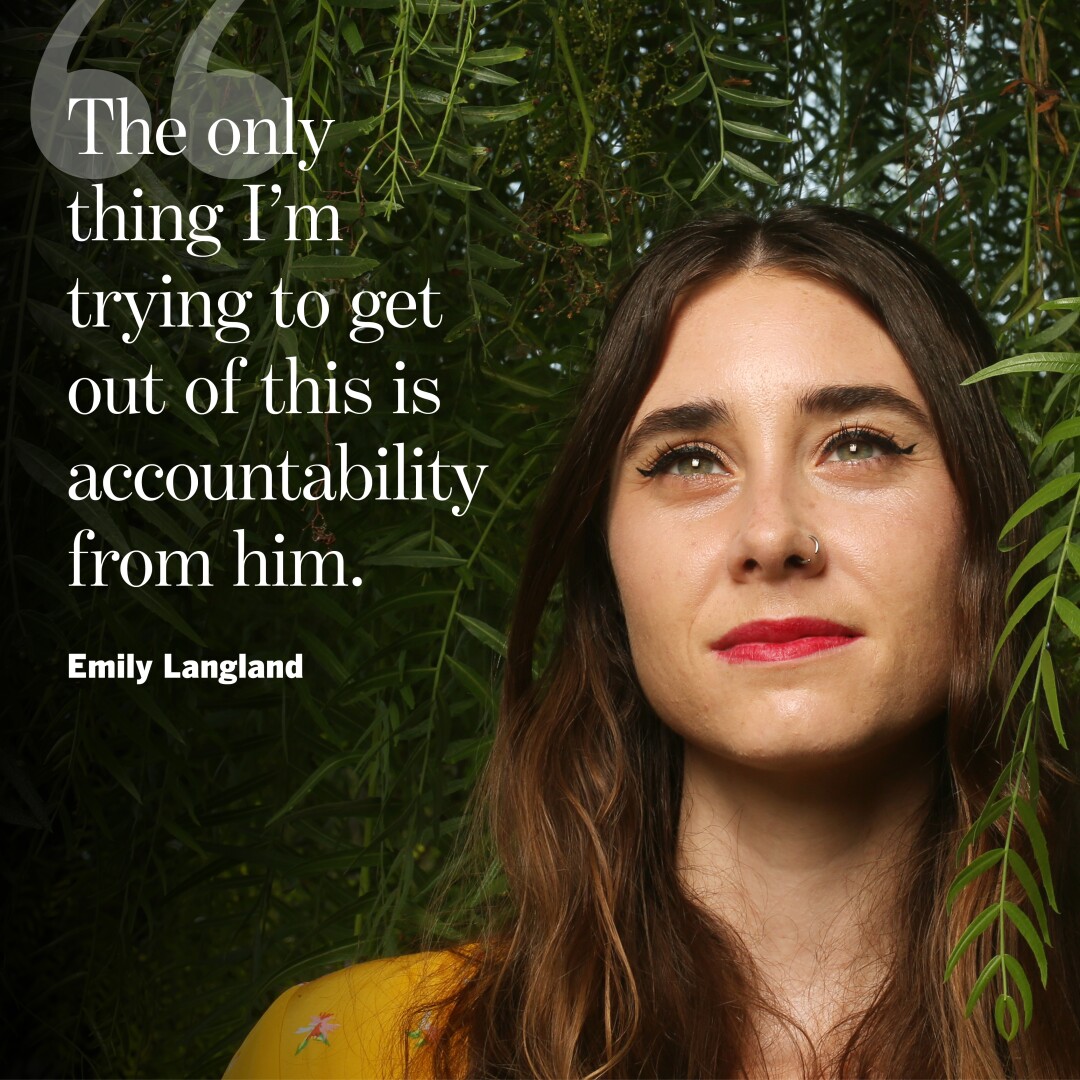
(Dania Maxwell / Los Angeles Times)
Emily Langland began going to shows at the Smell, a cavernous, graffiti-laden, all-ages club housed in an old concrete storefront in downtown L.A.'s Historic Core, when she was in high school.
Langland soon met a number of older fans on the scene, and made the trek to another beloved all-ages venue, the Glass House in Pomona, to see Atlanta-based garage band Black Lips, which headlined Burgerama two years in a row. Burger also reissued four of the band's albums on cassette.
Langland, then 17, was invited backstage by the opening band, and a few days later the singer of that band invited her to a house party in Echo Park.
It was there in 2011 that she met Cole Alexander, the guitarist for Black Lips, who recognized her from the show in Pomona.
Alexander, who was 29 at the time, soon began texting sexually inappropriate messages to Langland, she claims. She says he would text that he fantasized about her and that he liked being with submissive girls because he enjoyed holding the power in his relationships.
In one text that Langland shared with The Times, Alexander wrote that he wanted to try to have sex with her, using a more vulgar phrase.
"I like young people but that's tabboo [sic]. But I don't completely know why. I'm 29."
Langland says she was a little put off by his advances, but that she still counted herself a fan of his music.
"I went along with the things he was sending me," she says. "But I would try to change the conversation."
Langland and Alexander eventually had a sexual relationship when he was 30 and she was 18.
Alexander, when reached, declined to comment for the story. But in recent texts Langland shared with The Times, Alexander wrote that he thought what happened between them was appropriate.
"You know I would never prey on anyone," he wrote.
Langland disagrees.
"The only thing I'm trying to get out of this is accountability from him," Langland said. "I'm not trying to cancel him."

Taylor Kourkos was 16 when she became involved in a sexual relationship with the 21-year-old singer of the Burger-affiliated band Audacity.
(Dania Maxwell / Los Angeles Times)
Taylor Kourkos loved Burger bands and began going to all-ages shows when she was 16.
At the record shop, she says she was regularly invited into the back room and offered beer, alcohol and weed. Older guys from bands hung out there and Kourkos says they showered her with compliments.
Kourkos got into a band called Audacity, which released a 7" record and a cassette through Burger. After posting photos she took at a show, the band's lead singer, Matt Schmalfeld, flirted with her on social media.
Kourkos had to make a music video for her high school history class and asked Schmalfeld if he would be in it. To her surprise, he said yes. After that, they developed a closer relationship that she alleges soon turned sexual. Kourkos was 16, Schmalfeld was 21.
Kourkos says that Schmalfeld gave her alcohol, free tickets and backstage access. She says he made comments about how well-developed and mature she was for her age and told her they had to keep their relationship a secret.
"He told me that the band would break up, that he would go to jail and lose his job," Kourkos says.
Their relationship continued for a year. They would meet and hook up, and Schmalfeld would avoid being seen with Kourkos in public, she says.
"Eventually he got a girlfriend and I was completely forgotten," Kourkos says.
A friend of Kourkos, who used to go to Burger shows with her and took pictures of the bands, said in a telephone interview with The Times that Kourkos told him about her relationship with Schmalfeld at the time.
Schmalfeld declined to comment for this article.
When Kourkos was backstage at shows, she says there were usually other teenage girls. She says the guys in bands would offer them alcohol and drugs.
"There would be teenage girls passed out or freaking out on drugs at the shows, and they were always somehow being comforted by these older men, and not by their friends," Kourkos says. "It was a very dangerous environment."
One fan remembered hearing the men who frequented Burger shows referring to young fans as "Prosti-tots."
"They were literally luring children backstage, at the shop, to their homes, and in their cars," says Kourkos.

Charlotte Froom, formerly of The Like, alleges that she was sexually assaulted when she was 22. "In hindsight, it took me a lot of time to understand it wasn't my fault."
(Francine Orr / Los Angeles Times)
Charlotte Froom, 34, was once the bassist of the L.A.-based, Geffen-signed, all-female band The Like, and is now making music under the name Spiders & Hearts, which is signed to popular indie label Narnack Records.
When she was 22, Froom alleges she was sexually assaulted by Darren Rademaker, the vocalist and guitarist of L.A.-based psych-pop band The Tyde, which released a cassette titled "Darren 4" through Burger Records in 2016, and played several Burgerama festivals before that.
Froom says the incident happened after Rademaker drove her home from Little Joy, an Echo Park dive bar popular with musicians and artists in the area. The friends she came to the bar with had left and she found herself alone with Rademaker.
"I don't know how many drinks I had, because he kept putting drinks in front of me," Froom recalls. "My glass was never empty."
When they got to her neighborhood, he wouldn't let her out of the car in front of her apartment; instead, Froom says, he continued to drive around for almost 45 minutes until he could find street parking.
"I kept saying, 'You said you'd drop me off, please drop me off,' and he wouldn't let me out of the car, and then he forced himself into my apartment," Froom says.
Once he was inside he said they should have a nightcap. Froom says she was so drunk that she poured one, and after that she alleges that Rademaker raped her while she came in and out of consciousness.
Earlier in the evening, Froom said, "I was saying no to everything," recalling how she repeatedly had asked Rademaker to drop her off and to leave. But by the end of the night, she said, she was too intoxicated to consent. "I didn't feel I had any control of the situation."
"I was just like a dead body," she said. "There was fight, flight or freeze, and I was frozen."
Rademaker, she says, was married at the time, and Froom knew his wife, which only added to her anxiety and sense of shame afterward. It was that shame, she says, that kept her from filing a police report or otherwise going public with her experience.
Rademaker did not respond to multiple requests for comment.
"In hindsight, it took me a lot of time to understand it wasn't my fault," Froom says. "I was too ashamed to tell my therapist because I was like, 'I put myself in this position.'"
Froom eventually did tell her therapist who confirmed her story to The Times, as did her ex-husband, whom Froom told after they were married.
Froom's story mirrors stories told by other women who at first blamed themselves for the sexual abuse inflicted by men they trusted, dated or otherwise befriended.
"It's all controlled by men"
The community of outcasts that comprise much of the DIY/underground music scene, say the women and girls who belonged to it, presents itself as liberal and inclusive, but it often betrays those who need it and trust it the most.
"They think they're progressive because they're artists, but it's all controlled by men," says music fan and artist Amanda Martin, who was heavily involved in the So Cal music scene from 2003 to 2015. She recalls experiencing various forms of harassment and emotional abuse. "They get to choose who plays the shows and which girl gets to be in a band. It's easy for them to maintain power."
Women who play music in the scene know all too well the challenges of making art in testosterone-driven environments where they have to constantly be on the look-out for situations that could quickly become risky, says May McDonough, 35, who now works as a film composer, but fronted the garage-punk band The May Company.
McDonough had music released on Burger compilations and played many shows with Burger bands. She recalls that men in the bands would say sexually derogatory things about women in front of her and that one band even encouraged female fans to physically fight in order to determine who would be taken home by the band that night.
"It's already a ubiquitous part of our society," McDonough says of sexual abuse and assault. "And then you get down to this myopic rock 'n' roll culture. If you're a rock 'n' roller, if you're creative, whatever impulse you have is supposed to be indulged."
McDonough remembers an instance where she fell asleep alongside friends on the floor of the house where she was staying. When she woke, a man was spooning her with his hands down her pants. She said "no" three times, enough that she feared the situation could turn violent.
"I just wanted to be friends with other musicians," says McDonough. "We were three girls in a band, hoping to be a part of a community, and the feedback was, 'You will always be seen as this sexual component, and don't complain about it, because this is how things are.'"
For her part, Casey Redd is heartened by the sisterhood and support she found after creating Lured_By_Burger_Records, and she hopes this reckoning will lead to lasting change in the scene. She's still in shock that a once-thriving label — a label that used to play such a large role in her life — completely unraveled in less than a week, thanks to an Instagram page that gave voice to scores of women who had remained silent for too long.
"I wasn't expecting that at all, for them to just completely remove all presence from the internet," Redd says. "I still haven't been able to process it.
Redd stopped posting to the account at the end of July, writing that she needed an extended period of rest and recovery.
She's not sure what comes next. Healing, she says, is a lifelong journey.
Back Porch Music Personality Found Quilty of Sexual Misconduct
Source: https://www.latimes.com/entertainment-arts/music/story/2021-01-24/burger-records-musicians-sexual-misconduct
0 Response to "Back Porch Music Personality Found Quilty of Sexual Misconduct"
Post a Comment